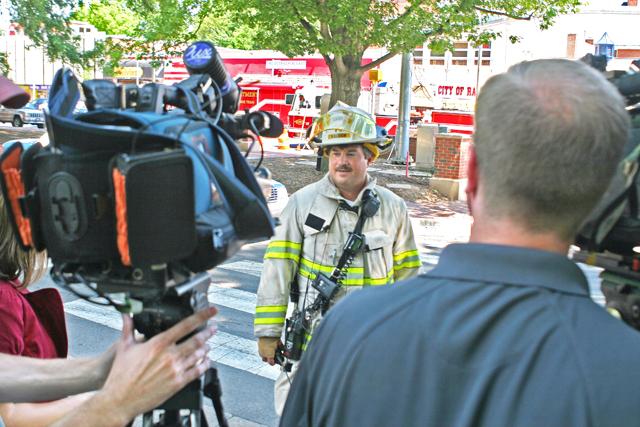The natural gas leak on Thursday which closed part of Hillsborough Street and led to the evacuation of several shops and buildings in the area did more than just inconvenience people. It also revealed a flaw in the D.H. Hill Library alarm system, leaving people on the second, third and fourth floors of the library’s bookstacks unaware of the emergency.
With the emergency doors closing off the different sections of the stacks, students who were listening to music were almost certainly left unaware. The sections of the library that were left vulnerable during the alarm were also the areas closest to the gas leak.
The problem was quickly identified by N.C. State’s Fire Protection department as a faulty relay switch, which is necessary for the alarms to activate because of the library’s complex system which uses three different panels to relay the emergency signals.
Fire Marshall Bill Stevenson explained that the relay switch had been experiencing complications in the days before the gas leak and was immediately replaced following Thursday’s alarm.
“On the previous alarm, the wire had come loose. We put it back in and it ran a silent test and it worked fine,” Stevenson said. “Thursday, the relay basically stopped working again. So it was immediately replaced.”
This is not the first time that the fire alarms in the stacks have had problems. Both, Susan Nutter, vice provost and director of libraries, and David Goldsmith, associate director for materials management, expressed concern about previous occurrences.
“What really concerns us is the previous times that this has happened,” Nutter said.
“About a year and a half ago, one of the pull stations was activated and the alarms went off but the alarms in the stacks did not go off,” said Goldsmith. “The electric shop came in and they did repairs to the panel.”
Stevenson explained that these things are going to happen but the University has great programs in place to assure students of their safety.
“N.C. State is very lucky we have a group such as the Fire Protection and Electronics Shop that respond and do what we do, keeping in constant contact,” Stevenson said. “Students come first and we have to make sure we take care of our students to ensure we continue to have a great university.”
However, there still remains the problem of an outdated and extremely complicated fire alarm system in perhaps the busiest building on campus.
”There are three different panels that service the four buildings and at least one is pretty antiquated,” Goldsmith said.
Nicholas Giron, junior in business administration, explained that the problematic alarm system should simply be replaced instead of constantly being repaired.
“They should update the old alarm system,” Giron said. “If there was a more serious situation, something bad could happen.”
Susan Nutter also said she was concerned with regulations on the faculty with regards to emergency protocol but that she believed there are alternative methods of conveying the emergency to those inside the building from the outside.
“There’s a protocol that we have to follow. We can’t go up into the stacks and notify people,” Nutter said. “There is a loud speaker system, but we don’t have the key to it. That could be an added way of notifying people that there is an alarm.”
Budget cuts have been detrimental to the libraries’ fire alarm renovation fund, keeping a renovation plan, originally drawn up in 2008, from being implemented. The library is planning a special appeal, which will be for a renovation repair project.
“The state didn’t provide any repair money during this fiscal crisis. That makes it tough for the university to respond,” Nutter said. “But I think there are avenues where you can get special dispensation.”
“The library is the most intense gathering space of students, the most heavily used public building on campus,” said Nutter. “In a lot of ways we see this as a reason for some of these issues to move to the head of the list.”








